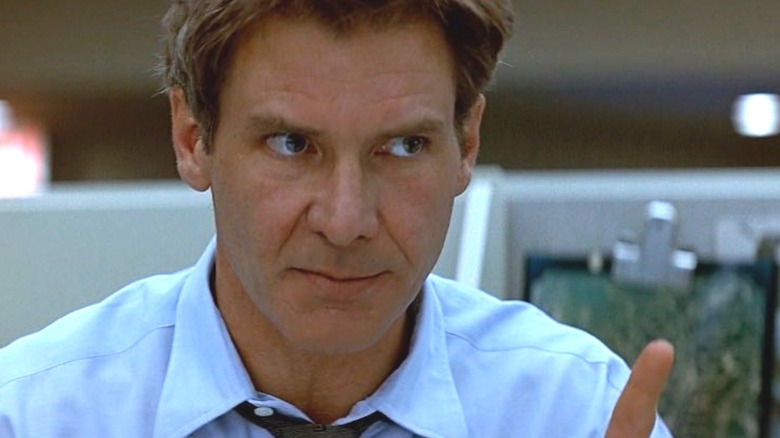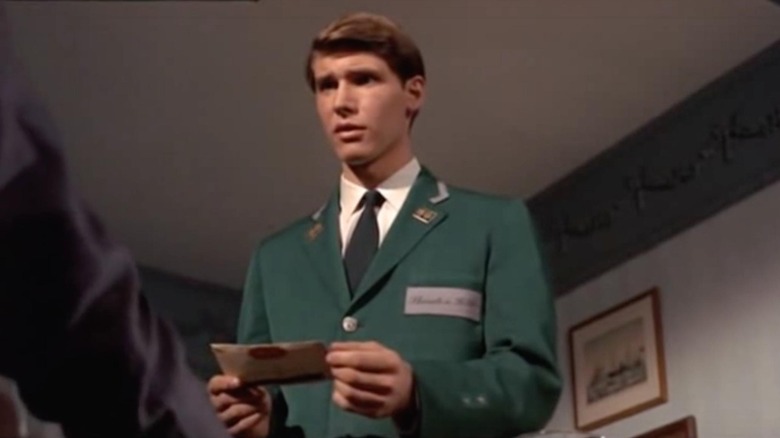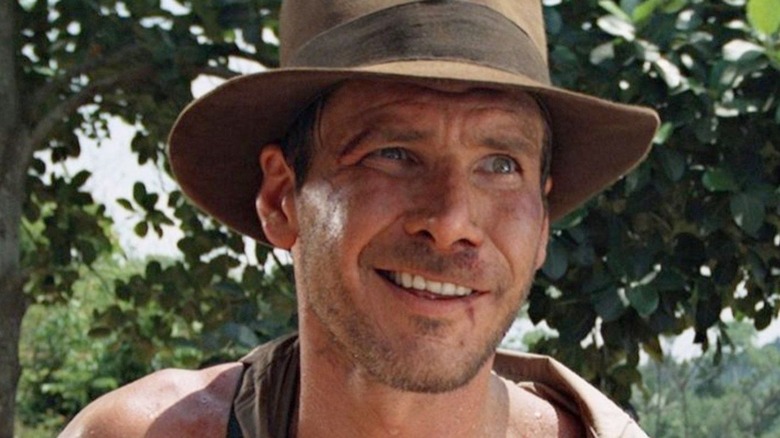Sharing The Screen With James Coburn Wasn't The Career Boost Harrison Ford Hoped It Would Be
11 years before Harrison Ford hit the hyperdrive to stardom via George Lucas' "Star Wars," he made his amusingly unassuming big-screen debut in the James Coburn vehicle "Dead Heat on a Merry-Go-Round." Directed by Bernard Girard (best known for ... well, "Dead Head on a Merry-Go-Round"), the film is a standard-issue con-man yarn designed to go as far as Coburn's considerable charm will take it and not an inch further. If you enjoy watching Coburn be Coburn, it's diverting enough, but the only reason it's at all notable today is for Ford's 30-second appearance as a bellboy.
This bit part was a test run of sorts for Ford, who'd joined Columbia Pictures' New Talent Program a year prior. By 1965, studios were getting out of the talent-development business, an old-fashioned system that required performers to report to the set every weekday in a suit or dress, and busy themselves with acting classes and promotional photoshoots. Ford was hardly a standout amongst his peers, but he was very handsome; ergo, he received a plum opportunity to briefly share the screen with the popular Coburn. Unfortunately, he misunderstood the assignment, which nearly derailed his career just as it was leaving the station.
The world's most complicated bellboy
Ford's scene is simple and relatively inconsequential. He's a clean-cut bellboy charged with delivering a message to a "Mr. Ellis." After repeating "Paging Mr. Ellis" a few times, Coburn calls him over. Alas, the message is for a different Mr. Ellis. (If this scene sounds vaguely familiar, that's because it was parodied at the end of "Pee-Wee's Big Adventure," the difference here being that Ford wasn't overdubbed by another actor.)
Ford's mistake was in overplaying his close-up. He plays the bellboy as a nervous lad whose expression veers from one of relief to profoundly disturbed. This isn't entirely his fault. Acting teachers tell their students to play bold actions, but the studio wasn't looking for the next Laurence Olivier here; they wanted to see the makings of a movie star. So when Jerry Tarkovsky, the no-nonsense executive who was minding the store for Columbia in Hollywood at the time, took a look at the scene, he was displeased. As Brad Duke explains it in his book "Harrison Ford: The Movies:"
"The executive proceeded to tell Ford the tale of the first time anyone had seen Tony Curtis. In Curtis' debut film, he was charged with the simple job of delivering a bag of groceries. The talent scout who had been watching this delivery boy made the distinction that Curtis was in fact not a delivery boy as he was meant to portray, but in fact a genuine movie star.
Stupefied, Ford leaned forward and stated that he thought Curtis was supposed to act like a grocery delivery boy – and not a movie star."
Oops.
Paging Mr. Ford
For questioning Tarkovsky, Ford promptly found himself in the doghouse — a precarious, potentially career-killing situation given that he'd signed a seven-year contract with the studio. Over this time, Ford booked a couple of nothing parts in Phil Karlson's "The Long Ride Home" and Clive Donner's adaptation of Murray Schisgal's hit Broadway play "Luv." The headstrong Ford quickly got fed up with Tarkovsky's insultingly meager assignments, and got himself expelled from the program.
Fast forward many years ahead. Ford had survived his rough first decade in Hollywood to become one of the biggest stars in the industry. One night, at a fancy party, a waiter carrying a silver tray approached Ford. On the tray was a card, which he handed to the actor. The card bore a simple message: "I missed." It was signed by Tarkovsky.


